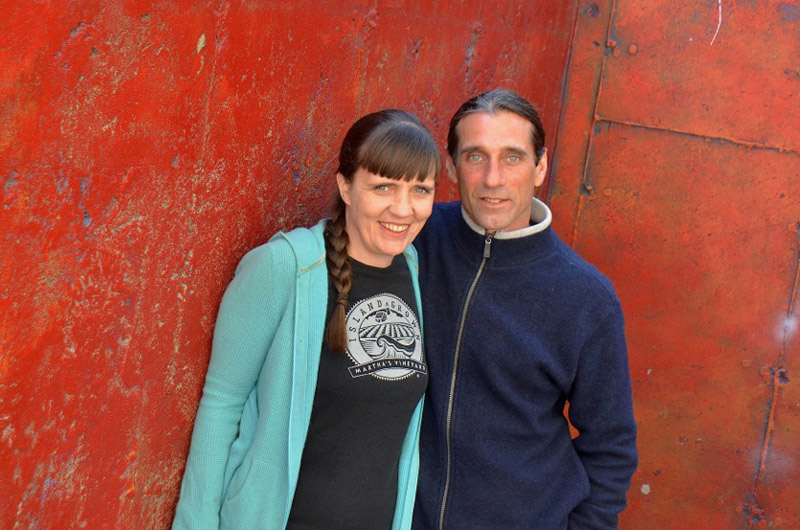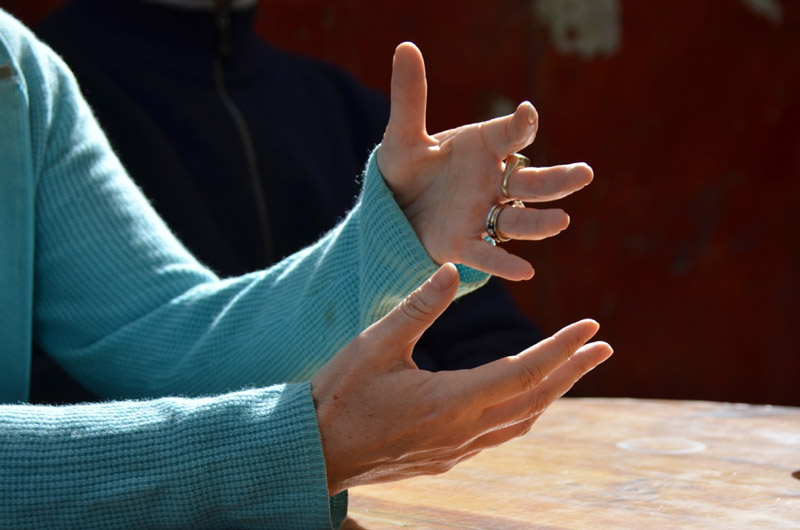Planting a Seed Library - Sustainable Martha's Vineyard documentary series from Film-Truth Productions on Vimeo.
This Earth Day, Liz Witham and Ken Wentworth of Film-Truth Productions in Aquinnah are planting a seed. Their Sustainable Vineyard film series, which began in 2010 and includes a dozen titles, launches Friday on a new website, sustainablemarthasvineyard.org.
Over the last two years, the Island couple has shot, edited and produced eight films for the series, with funding from the Martha’s Vineyard Vision Fellowship. The online release will collect all the films in one place with the goal of reaching a wider audience and being available as learning tools around the region.
Appropriately, it begins with The Story of Seeds, a short documentary about the MV Community Seed Library in West Tisbury, which encourages local resiliency and helps useful plant species thrive on the Island. The nine-minute documentary explores the process, where people can check out seeds from the West Tisbury Library, plant them and then bring back the new seeds. As with all the films in the series, it highlights the connections between Islanders and their environment.
The series also drops in on Island scientists studying the northern long-eared bat, which has been decimated by white nose syndrome but appears to be alive and well on the Vineyard, sustainable farmers, and members of the critical but often overlooked conch fishery. A new film will be posted every two weeks, with related outreach on and off the Island.
“It’s always been our intent that the films be used to help spur action,” Mr. Wentworth said on a sunny day this week, sitting with Ms. Witham outside Nat’s Nook in Vineyard Haven. The short segments were designed as much to inspire and inform as they were to distribute easily on the internet. Each episode involves partnerships that may further widen the audience.
The Story of Seeds is a collaboration with the Farm Institute, the West Tisbury Public Library and Island Grown Initiative, along with the national Organic Consumers Association, and Regeneration International, which will help share the episode online. Many of the films, including Where Did the Bats Go?, about the northern long-eared bats, have become learning tools for Island students and communities on the mainland.
The Vineyard Vision Fellowship has kept the project going for the last two years, and Mr. Wentworth and Ms. Witham hope to continue with funding from the community. Future topics may include water and waste issues on the Vineyard, and the critically endangered right whales that still pass by on their migration routes.
The couple founded Film-Truth Productions in 2003 and have been making films together ever since. Ms. Witham said the name summed up the company mission. “It’s our mantra, it’s our mandate,” she said. “How do you film truth?” The name is a literal translation of cinéma vérité, a style of documentary filmmaking pioneered in France in the 1960s that uses improvisation and other techniques to frame everyday situations.
Ms. Witham and Mr. Wentworth work entirely on location, often using hand-held cameras that create a sense of place and put the viewer on the ground with them. Beginning in 2009, the couple began zeroing in on the intimate connections between humans and nature on the Island, an approach that grew out of their Greening Eden series, which has covered climate change conferences and sustainability efforts around the world.
“Even though there are issues all over the world, the place you can most impact is where you live,” said Ms. Witham, who grew up in Aquinnah and studied documentary film at Stanford University before returning to the Island with Mr. Wentworth in 2003. “That’s what you observe, that’s where you have power.”
“I think its hard to live on Martha’s Vineyard and not feel connected to the place,” she added, although even longtime Islanders may be surprised by some of the topics in the Sustainable Vineyard series. She recalled her own surprise at learning that conchs are the Island’s largest fishery. “Most people don’t know that,” she said, noting the possible risks of ocean development.
But a sense of place comes naturally on an Island, she said, and sets the tone for the series.
“We have an opportunity here, because we are an Island, to try things as an Island community,” and other communities can learn from the example, she said. She saw the Vineyard’s geographic isolation as an asset to sustainable living, especially as it relates to Islandwide efforts. “I think here we have more of that feeling — if the whole Island can come together to do this or do that, then we are changing the way a whole community works.”
Mr. Wentworth compared the Vineyard to communities in mountains or valleys that also retain a strong sense of place. “We have a habitat that is becoming fragmented, but yet still is resilient and thriving,” he said, noting the pockets of sandplain grassland and other intact ecosystems around the Island. “We’ve got this huge thing going for us, and a strong community bond.”
Local identity and a connection to nature are the foundation of the Sustainable Vineyard series, and are strengths that the Island can share through film, Mr. Wentworth said. “The more that we feel like we are part of nature, the more chances we have of taking action that we need to take.”
The Sustainable Vineyard documentary series may be viewed starting Friday, April 22 at sustainablemarthasvineyard.org. For more information about Film-Truth Productions, visit film-truth.com.






Comments
Comment policy »